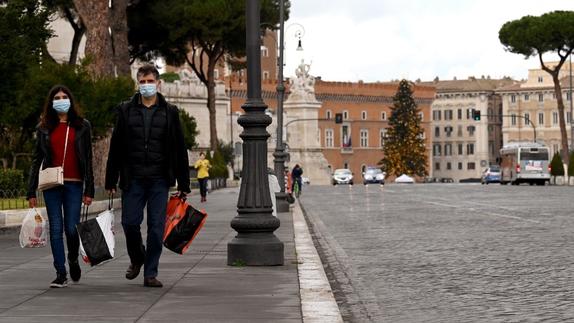 Pedestrians wearing face masks walk on an almost empty street in Rome, Italy, on Dec 24, 2020, amid a partial lockdown imposed over the Christmas and New Year holidays in a bid to curb the spread of COVID-19. (VINCENZO PINTO / AFP)
Pedestrians wearing face masks walk on an almost empty street in Rome, Italy, on Dec 24, 2020, amid a partial lockdown imposed over the Christmas and New Year holidays in a bid to curb the spread of COVID-19. (VINCENZO PINTO / AFP)
An Italian was found to have been infected with COVID-19 in November 2019, making her "patient zero" of the coronavirus outbreak in Italy, which has been one of the deadliest in Europe.
The 25-year-old in the northern Italian city was affected by an atypical dermatitis, and a biopsy on her skin highlighted the presence of the novel coronavirus, said a research by a team of scientists at the University of Milan.
The study, published on Jan 7 by the British Journal of Dermatology, identified the presence of RNA gene sequences of the SARS-CoV-2 virus dating to November 2019.
I wondered if we could find evidence of SARS-CoV-2 in the skin of patients with only skin diseases before the officially recognized epidemic phase began.
Raffaele Gianotti, researcher at the University of Milan
"There are, in this pandemic, cases in which the only sign of COVID-19 infection is that of a skin pathology," said Raffaele Gianotti, who coordinated the research.
"I wondered if we could find evidence of SARS-CoV-2 in the skin of patients with only skin diseases before the officially recognized epidemic phase began," said Gianotti, adding "we found 'the fingerprints' of COVID-19 in the skin tissue".
Based on data in the world literature, this is "the oldest evidence of the presence of the SARS-CoV-2 virus in a human being", said the report.
An earlier study by Italian scientists had detected the virus in a 4-year-old boy's throat secretions, following a swab test conducted in early December 2019.
A separate Italian study last year suggested that the coronavirus may have been circulating in the country as early as September 2019.
As vaccinations scale up in Europe and other regions, scientists at the World Health Organization warned that mass campaigns would not bring about herd immunity to the coronavirus this year.
The WHO's chief scientist Soumya Swaminathan warned on Monday that it would take time to produce and give enough shots to halt the spread of the virus.
"We are not going to achieve any levels of population immunity or herd immunity in 2021," she said.
ALSO READ: Finding patient zero 'extremely difficult'
Rise in infections
Infections are surging around the world, with more than 90.9 million confirmed cases and 1.94 million deaths by Tuesday, according to Johns Hopkins University.
In Europe, Portugal's President Marcelo Rebelo de Sousa has tested positive for coronavirus and canceled all public engagements, his office announced late on Monday.
The 72-year-old head of state was isolating in the presidential palace in Lisbon, his office said in a statement.
Last Wednesday, he had spent a few hours in "administrative isolation" after a member of his entourage tested positive, but the president tested negative at the time.
Greece is among European countries stepping up its vaccination programs. On Monday, the government opened a website for people to register for vaccinations, following an initial phase that targeted top-priority groups.
In Japan, Prime Minister Yoshihide Suga was reported to have told a meeting of ruling party members on Tuesday that he would declare a state of emergency for the western prefectures of Osaka, Kyoto and Hyogo to stem the spread of COVID-19.
Responding to pressure from Tokyo and three neighboring prefectures in eastern Japan, Suga last week declared a monthlong state of emergency for that region.
READ MORE: EU seeks up to 300 million more Pfizer-BioNTech doses
Liu Xuan in Beijing, Xinhua and agencies contributed to this story.


